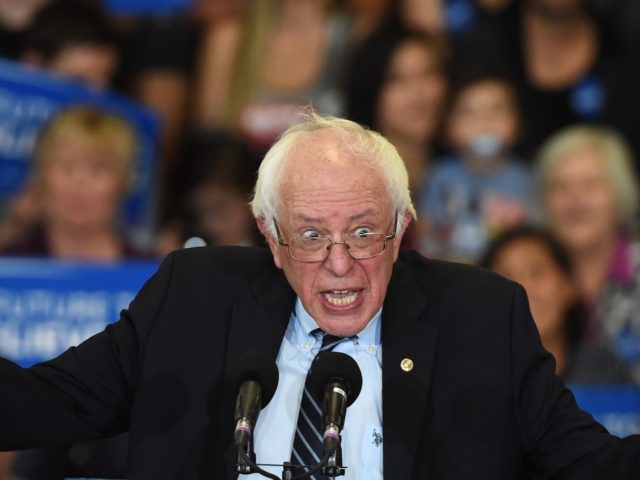Socialist Sen. Bernie Sanders (I-VT) said Friday that his ideas are not radical and are practiced all over the world, citing the welfare systems of Norway and Canada in an interview with Pod Save America.
Sanders argued that his socialist ideas are not radical, although he admits the word “democratic socialism” makes people “upset” and “scared.”
“Look–this is what I think and this is not radical and I don’t want the word Democratic socialism, you know to get people upset or scared, ” he began before speaking highly of Norway, a potential model for the U.S.:
Just take a look at a country like say Norway. All right, you have a baby in Norway. What do you get? You get, if my memory is correct, you either get 12 months off paid leave or I think you get 12 months off at 80% of your pay or 10 months off at all of your pay. Okay. You have excellent quality and affordable childcare. You have a strong and very good public college–public education system.
Norway’s population is significantly smaller than the U.S., with just 5.3 million to America’s 327 million. A plethora of economic and ideological differences exist, but one significant factor is the money spent on defense. The head of the Norwegian Armed Forces’ operational headquarters (FOH) admitted in April that the country lacked the resources to defend itself from a potential attack.
As Breitbart News reported:
Speaking to Norway’s state broadcaster NRK, Lieutenant-General Rune Jakobsen said, “If there is an attack in the classical sense, then we do not have the robustness that is necessary [to defend ourselves].”
“The most serious issue is the size of the land,” Lt Gen Jakobsen said. “Reactivity, robustness, and endurance in all branches of defence are too low, and to be concrete: The army is too small in relation to the tasks it has and what is expected of Norway and in NATO.”Lt Gen Jakobsen said in his assessment that Norway needs two new warships, two new submarines, and a better plan for the transition from old to new materiel in the Air Force.
Norway, which shares a land border with Russia, was criticised by U.S. President Donald J Trump last year for “lack[ing] a credible plan to spend two per cent of its gross domestic product on defence.”
There are also rumblings that the welfare model will bottom out, with the younger population shrinking, which means fewer taxpayers to take on the “increasingly heavy burden of the welfare state.”:
There’s no single explanation, but financial uncertainty and a sharp rise in housing costs are seen as likely factors.
In the long term, this means there will be fewer people of working age to pay taxes that fund the generous state welfare systems.
These systems pay for, among other things, lengthy parental leaves, which in Sweden can last up to 480 days.
“So when I talk about these ideas, which get people very nervous– guess what? They are existing all over the world,” Sanders continued before praising Canada’s universal health care system.
“I live 50 miles away from the Canadian border. You go into Canada, you have a heart transplant. You know how much it costs you when you come out of the hospital? Nothing,” he said.
According to a Fraser Institute study released last year, Canada’s health care system forced one million patients to wait for “medically necessary treatments” in 2017, which resulted in roughly $1.9 billion in lost wages, according to Forbes.
Forbes continued:
The only thing Canadian patients are “guaranteed” is a spot on a waitlist. As the Fraser report notes, in 2017, more than 173,000 patients waited for an ophthalmology procedure. Another 91,000 lined up for some form of general surgery, while more than 40,000 waited for a urology procedure.
All told, nearly 3% of Canada’s population was waiting for some kind of medical care at the end of last year.
Those delays were excruciatingly long. After receiving a referral from a general practitioner, the typical patient waited more than 21 weeks to receive treatment from a specialist. That was the longest average waiting period on record — and more than double the median wait in 1993.
Rural patients faced even longer delays. For instance, the average Canadian in need of orthopedic surgery waited almost 24 weeks for treatment — but the typical patient in rural Nova Scotia waited nearly 39 weeks for the same procedure.
Sanders dismissed the massive economic, ideological, and logistical differences between the U.S. and the countries cited and refused to allow them to stop his advocacy for Medicare for All.
“We are the only major country on Earth that doesn’t guarantee healthcare to all people,” he said in the interview.
Listen to the full interview below:

COMMENTS
Please let us know if you're having issues with commenting.